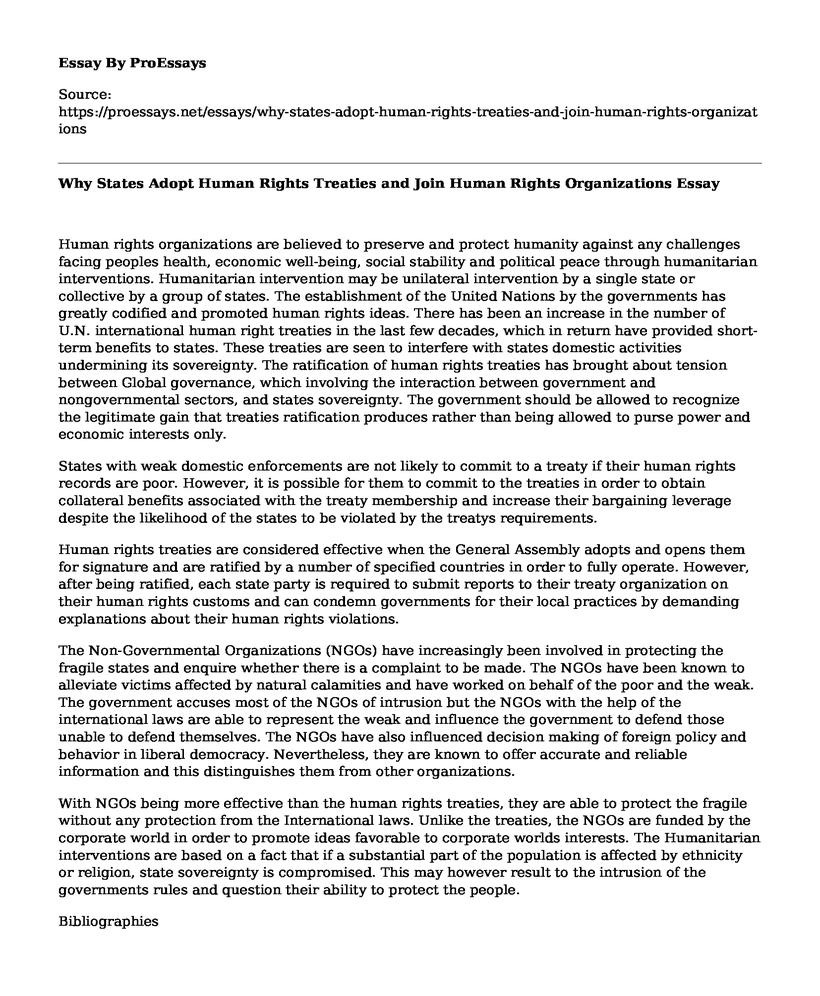Human rights organizations are believed to preserve and protect humanity against any challenges facing peoples health, economic well-being, social stability and political peace through humanitarian interventions. Humanitarian intervention may be unilateral intervention by a single state or collective by a group of states. The establishment of the United Nations by the governments has greatly codified and promoted human rights ideas. There has been an increase in the number of U.N. international human right treaties in the last few decades, which in return have provided short-term benefits to states. These treaties are seen to interfere with states domestic activities undermining its sovereignty. The ratification of human rights treaties has brought about tension between Global governance, which involving the interaction between government and nongovernmental sectors, and states sovereignty. The government should be allowed to recognize the legitimate gain that treaties ratification produces rather than being allowed to purse power and economic interests only.
States with weak domestic enforcements are not likely to commit to a treaty if their human rights records are poor. However, it is possible for them to commit to the treaties in order to obtain collateral benefits associated with the treaty membership and increase their bargaining leverage despite the likelihood of the states to be violated by the treatys requirements.
Human rights treaties are considered effective when the General Assembly adopts and opens them for signature and are ratified by a number of specified countries in order to fully operate. However, after being ratified, each state party is required to submit reports to their treaty organization on their human rights customs and can condemn governments for their local practices by demanding explanations about their human rights violations.
The Non-Governmental Organizations (NGOs) have increasingly been involved in protecting the fragile states and enquire whether there is a complaint to be made. The NGOs have been known to alleviate victims affected by natural calamities and have worked on behalf of the poor and the weak. The government accuses most of the NGOs of intrusion but the NGOs with the help of the international laws are able to represent the weak and influence the government to defend those unable to defend themselves. The NGOs have also influenced decision making of foreign policy and behavior in liberal democracy. Nevertheless, they are known to offer accurate and reliable information and this distinguishes them from other organizations.
With NGOs being more effective than the human rights treaties, they are able to protect the fragile without any protection from the International laws. Unlike the treaties, the NGOs are funded by the corporate world in order to promote ideas favorable to corporate worlds interests. The Humanitarian interventions are based on a fact that if a substantial part of the population is affected by ethnicity or religion, state sovereignty is compromised. This may however result to the intrusion of the governments rules and question their ability to protect the people.
Bibliographies
Hathaway, Oona. 2007. Why do countries commit to human rights treaties? Journal of Conflict Resolution 51/4: 588-621. JSTOR: http://ezproxy.apus.edu/login?url=http://www.jstor.org/stable/27638567
Wotipka, C. M. and K. Tsutsui. 2008. Global human rights and state sovereignty: Nation-states ratifications of international human rights treaties, 1965-2001. Sociological Forum 23/4: 724-754. EBSCO: http://ezproxy.apus.edu/login?url=http://search.ebscohost.com/login.aspx?direct=true&db=aph&AN=35035125&site=ehost-live
Schneider, Christina. 2011. Weak states and institutionalized bargaining power in international organizations. International Studies Quarterly 55/2: 331-355. EBSCO: http://ezproxy.apus.edu/login?url=http://search.ebscohost.com.ezproxy1.apus.edu/login.aspx?direct=true&db=aph&AN=61036653&site=ehost-live
Benjamin, Dave. 2009. Protecting the protectors: NGO action and the responsibility to protect. International Journal on World Peace 26/1: 31-50. EBSCO: http://ezproxy.apus.edu/login?url=http://search.ebscohost.com/login.aspx?direct=true&db=aph&AN=38018234&site=ehost-live.
Cite this page
Why States Adopt Human Rights Treaties and Join Human Rights Organizations. (2021, Mar 11). Retrieved from https://proessays.net/essays/why-states-adopt-human-rights-treaties-and-join-human-rights-organizations
If you are the original author of this essay and no longer wish to have it published on the ProEssays website, please click below to request its removal:
- Essay Example on Masculinity in Guyland: Toxic Behaviour Towards Women
- Essay Sample on Biological vs Social Race: Distinctions and Causes
- Essay Sample on The ACA: Transforming US Healthcare System Since 2010
- Government of Austin: Tax & Other Revenues for Financial Progress - Essay Sample
- North Korea's Human Rights: Report & Recommendations - Essay Sample
- Free Essay Sample on Media Fear of Crime: Linked Subjects and US Crime Rate
- Applying Nelson Mandela's Leadership Skills to My Leadership - Essay Sample







